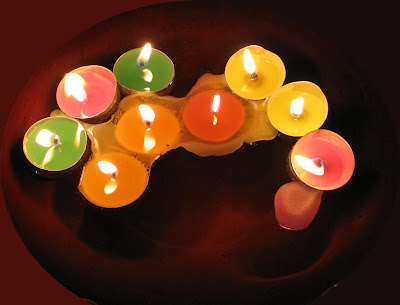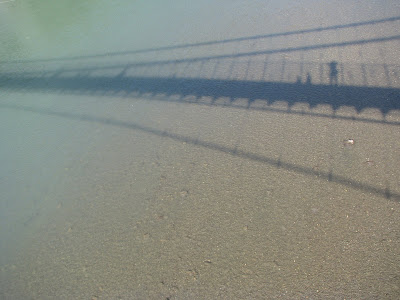
What would I do without a mind?
What would I do without a society to shape that mind?
To influence it?
To taint it?
To glorify it?
What would I do without the memories of such glory and such tache?
An orphan on a deserted island, with nothing from the outside world,
save the produce of Nature which surrounds me.
I suppose I would be free....
Monday, December 22, 2008
Another year does pass

Friday, December 12, 2008
Wandering

Wednesday, December 10, 2008
Incomplete
Which doesn't remind me of you.
The walk
Dinners
People-filled agoras
A night passed without a "good-night".
I never wished to think

Of walking the journey
Without you.
Our steps drumming the earth
Gave rhythm for my heart.
We don't speak
We don't hold hands
We don't argue
We don't live the truth
Of two hearts alloyed as one.
Last night, I walked back
And could hear your voice
Chatter in the silence of this world
Tell me things I knew you would
Ask me things I hoped you didn't
Laugh and tease and nearly get me
Run over by a car.
Last night I knew
That incompleteness
Is not the lack of completeness
It is the rightness
Of flame with wick
Though both are complete,
It is the beauty of a void
Which lets me want you.
Menakaa - Vasanth Kannabiran and Rajeswari Sainath

I had the pleasure of attending a dance ballet at the Music Academy. A very kind friend gave me the invites to this event and I was quite impressed with the crowd that attended this. As in most art circles, there were the bohemian few but a lot were the well composed and elegant kinds that educe a quiet respect by their presence. I wasn't armed with my camera so the pic here is courtesy The Hindu of an earlier performance.
Menakaa was conceived and written by Vasanth Kannabiran. When Roshni Goswami summarised the performance as "bringing together radical feminism and aesthetics", I had to agree with her. Vasanth (she founded Asmita) has attempted to re-interpret an old tale, but the mark of a re-interpretation is usually cleverness and a convincing argument. In that Vasanth has failed. She has taken the story of Vishwamitra and Menaka down to Bharata and his adopted son and converted it into an accusation against men. There is nothing clever in this. One can always take a story and turn it around to make the other person the culprit. One could make Duryodhana look innocent or Chanakya a bigot but there is hardly any creativity in there especially if not developed properly. To be able to tell a tale of how Duryodhana and Draupadi team together to destroy Hastinaputra might be something different and untold (and perhaps it never happened). If one doesn't wish to fictionalise a legend then one has to be clever in re-interpreting the tale. Vasanth fails here.
She has taken the tale of Vishwamitra and portrayed Menaka as not being a seductress. That is fine if she could have explained why then did Menaka come down to earth on Indra's bidding and dance around Vishwamitra. That was missing. Then Menaka blames Vishwamitra for being a typical male in "planting his seed in her womb and running away". That is quite possibly a familiar case but how then does she explain Menaka delivering Shakuntala and rushing off to the heavens to continue with her dance and courtesan duties? She doesn't. If Vishwamitra identified his purpose of becoming Brahmarishi (which he did) and hence returned to his penance (and not other hedonistic pursuits) how is that vile when compared to Menaka delivering Shakuntala, leaving her in the forests and returning to Devaloka (world of Devas)? Vasanth doesn't bother to explain and probably expects the audience to cast angry glares at Vishwamitra thereafter. Vishwamitra set out to achieve something, was interrupted and then resumed. Perhaps he was violent in between and that portion cannot be questioned in an interpretation. Vasanth's point of a man's anger in being proved petty and human enough to be incapable of aspirations as high as Brahmarishi are convincing and appear plausible. The take that Vishwamitra was ashamed of himself for falling prey to the call of this world when he had set his eyes on something else, hence, mutated that embarassment into a violent rape of Menaka could be well made and accepted, but the rest of it fell short of a cogent reasoning. Vasanth was more keen on establishing all men as perpetrators of violence and all the women (who participated in it) as being entirely innocent or justified. That would have been welcome if there was a convincing argument woven out of history.
Another point that Menaka makes is that she decided to bear the child (Shakuntala) because she thought that the child - a confluence of Vishwamitra's prowess and intellect and her beauty and charm - would be a wonderful son who could rule this earth. But when a girl was born she left to the heavens. That is a take I couldn't understand in the telling of a feminist tale. I thought Menaka would have taken care of her or left her in the hands of powerful teachers to raise her to become the ruler of the earth. Not quite the plan Menaka had in her mind.
Then Vasanth goes on to create the case of pure innocence and desertion of Shakuntala. Menaka claims that Durvasa's curse had nothing to do with Dushyant forgetting. He simply didn't want to have anything to do with a woman he had deflowered and enjoyed, which is possible and acceptable as an interpretation if she could explain why Dushyant saw the ring, regained his memory and returned to collect both Shakuntala and her child. Dushyant had no problems of heirs. He could have well married a few hundred princesses and had a few dozen children. Why return to Shanuktala and take her back with him to his palace? This has not been explained and hence the whole interpretation appears shallow.
Going by records, Bharatadesha has seen many illegitimate children and rulers so that is not news. But an attempt at re-interpreting things is welcome as long as there is a lot of creativity or sound basis (like I am told about Girish Karnad's Tipu Sultan) and convincing argument. Menaka fails in that. Hence, this play is as Ms. Goswami notes radical feminism and not the educating and transforming feminism that I respect and enjoy.
The dance choreography was fine though faulty in many places. The faults fell in the category of coordination and suitable bhavas. The layas were honoured well though the transitions were often blurred or fumbled. When there were more than two artists on stage coordination was an issue and this was starkly visible. When the sutradharini, Nainitha started out explaining the prayer to Saraswati, her gestures were not matched with the ideas/words being explained. Similar gestures were made for two unrelated ideas and Nainitha cannot be blamed for it! Nainitha was one of the gems of the evening (though she has to be more conscious of her foot work). Perhaps Rajeswari should have donned the role of a Sutradharini and let Nainitha take over as Menakaa (from sheer consideration for age and the ability to execute vigourous steps and sensuous ones too), but perhaps it is not protocol to have the teacher do a lesser role. The fillers between two pieces of music were also not gripping enough. A filler, once it feels like a filler, has failed in its purpose.
Rajeswari was good and her expressions and timing were appropriate. I was forewarned that I should not expect the usual flexibility of dancers in her and I realised why that notion was formed. She told the tale well and held the audience attention till the very end. I think she has to get her students to focus on foot work which is given lesser attention.
Nainitha as the sutradharini was very good in her crisp execution of steps though the flaws in choreography did do some damage. Her foot work was dragged - literally and figuratively - but her mudras were beautifully drawn out. Her expressions were appropriate and didn't give into exaggerration that one often sees in dancers. She too failed to coordinate well when there were more than 2 dancers on stage.
Vaishnavi Sainath was Shakuntala. Elegant and voluptuous, she carried off the scenes of the shy nubile very well although her initial display of wantonness was rather fudged. I might be wrong but her knees seemed to not cooperate well with her which might also explain her reluctance to go into the arai-mandi stance while performing some of the pieces. She must pay attention to her weight if she wishes to perform various roles demanding a more malleable form. Her bhava was fine though not entirely well pronounced.
The rest of the dancers were clearly amateurs and have a long way to go before grabbing audience attention. These three dancers stole the limelight and the points I raise before do not tell on their talent or capability as a dancer.
In spite of all this, I enjoyed the evening and simply couldn't take my eyes off the stage. Before the performance started I saw the world of Music Academy as I had heard of from my parents and grandparents. It was indeed interesting to watch patrons of arts and itching-to-be-celebrities interact with each other. I had but Le Clezio giving me company though beside me was this artist who seems to be quite famous (she did state that she plays - something which she didn't mention - for nearly all the artists though not for dance) whom I didn't recognise or disturb.
Tuesday, December 09, 2008
Rebuild India Plan
Of the many initiatives that have come up recently in the wake of the Bombay attacks, I find this site doing a good job. They have a questionnaire which seeks to gather information and opinion. They also seem to have a plan of action which reassures that not everyone is clueless enough to just have candle parties and beach side congregations. Please go visit them and offer your opinion.
With this post, I am done with talking about terrorism and what can be done. I pray to God that I do not have to write about this anymore. Here are the posts that touch this topic:
- Being Responsible
- Mumbai Meri Jaan
- Bombarding Thoughts
- A Prayer that I still believe we need
Monday, December 08, 2008
Simple words, please
When trying to understand literature, I tried the same policy and I was called old-fashioned. I have explained here what I mean by good writing and in other places too. Post-modernists use fantastic and intangible terms to explain literature with quaint phrases like "stream-of-subversiveness" or "disaffiliation". I felt the same way about the complicated world of diets (and the French are delightful in their gastronomic ways).
When I read Liar's Poker, I kept wondering why do these people use such complicated ideas for doing something basic and concluded that I was basically incompetent to comprehend the world of finance and economics (I still think so). Then I would read Buffet and feel a little reassured. He never spoke in terms of "credit-default swaps" or C.O.Ds. That made him very approachable and very rich too.
Now I finally read someone who voices my thoughts in a place which lends it credibility. Please read this. You might also want to read Lewis' piece out here. He seems to have come one full, long, stretched circle. I have been wanting to share these links for a long time but terrorism has occupied my mind.
You might want to watch this (2 hours in length) to watch how complicated thoughts, the world of terrorism and finance are so tied together. Don't believe all of it. Just enjoy it and decide to dig deeper into things. And most importantly, trust simple words, please. Anything that requires a lot of hand-waving usually has something fishy in it.
Sunday, December 07, 2008
Bombarding Thoughts

The first email I received was about Gnani Sankaran's article. I came down on it very strongly because he seems to have given into an emotional reaction which was uncalled for. This whole approach of calling those who visit the Taj as "the Mafiosi of Mumbai forever financing the glitterati of Bollywood (and also the terrorists) , Political brokers and industrialists" and as "swindlers" is too rash and typical enough to be ignored. The worst flaw in his development of his argument starts when he says that the Taj is not a representation of the "Aam Aadmi" and it is the CST which is the icon of India/Mumbai. He then says that "It is precisely because Taj is the icon of power and not people, that the terrorists chose to strike." and then fails to explain how the maximum deaths happened at CST if the Taj was chosen by the terrorists. If he admits that the Taj was the chosen spot then why does he want the media to cover CST when the action out there was wrapped up pretty quickly and the hostage situation was mostly happening at the Taj? The whole anti-rich tone was sad and factious. We don't need more divisions being created now. Nobody takes the media seriously what with their stupid interviews and screaming.
He then suggests that the media studios should pool their resources if they expect different party leaders to travel together and show solidarity. The parties and their leaders are not supposed to be commercial entities (at least in principle) and are supposed to "serve" the people. The media houses are here for business and not for humanitarian purposes. What am I missing here? They will do anything to get more business and hence, money. Why else would you have commercial breaks between live telecasts of whatever was happening? I am sure those slots must have come very very highly priced. Even the businesses which were running their commercials did not take that slot to express a prayer for the people trapped in the Taj or elsewhere! They were using the slot to further their business opportunities. But this is not the motivation for party leaders, I hope. At this point they should be together and not as rival parties. The govt. and opposition are primarily instruments to ensure that the best is realised for the country. The opposition is designed to keep a check on the ruling party which in turn does all that it can in order to give the public the confidence in their ability to rule the country's policies. At the time of crisis, there is only one course of action and hence, they need to be together. That doesn't mean that all businesses need to do that. He blames the media for not carrying photos of the unidentified people. Well, the newspapers didn't do that too, so shouldn't we line them all up and teach them a lesson or two?
Finally, he assumes that the commandos were at Ratan Tata's disposal! I am not sure where he got that idea. They seemed to be more at the terrorist's disposal!!
He ends the litany with some valid questions about the effective handling of the situation by the commandos and NSG (please refer to similar points raised in my previous post). While the country mourns Sandeep Unnikrishnan's death (I feel sorry for his family) it was not the wisest move to make by announcing “Do not come up, I will handle them.” If he really said that then I hope we realise that this is not Rambo VI. What was required was planned team work to tackle the terrorists and not a one-man-army show. I think that is where the mistake was. He should have assessed the situation, retreated, discussed and agreed on a course of action and then moved on further. What if the terrorists panicked and killed hostages on seeing the army attack them? Was this the wisest move to make? It probably seems like a brave move, but in the light of the situation I don't think it was responsible. Unfortunately, it was also futile because he was injured before he could take down even one terrorist. If he was the only man in the building in a position to take the terrorists down, he should have still passed on some communication to the outside world and then tried to tackle them if there was no other way out (watch Die Hard part I to get an idea). I feel so silly having to quote Hollywood movies here, but to be honest what they show on screen is the closest to a responsible and informed approach to such situations.
The next email I received was the response of a Dev Sukumar to a Mr. Mani (whom we shall assume to be an anti-Islamist as Dev paints him to be). You can find the email in this post. Dev has raised a very cogent argument against this Mr. Mani and I am glad to read something like this after a very long time spent in reading blurts and frothing. He mentions a Belthur temple and I could find no reference to that on the net. I need to run to a library to be able to find evidence of the same or visit that temple premises. Let us assume that what he quotes is true. About Badami burning for 9 months, I simply don't believe there is anything in any city, modern or ancient, that can sustain 9 months of fire. So I'll discard that as a myth.
He raises a point that temple desecration existed before Muslim invasion when Shaivite camps destroyed Vaishnavite temples (and vice versa). I am still to verify these claims (and Dasavatharam is not sufficient evidence!). If we assume this to be true, it forms the basis for his point about temple desecration being "political policy, not a religious one". The Muslim invaders and rulers didn't do it as a political policy but as a religious one and hence the difference. I hope this is realised. It was against their religion to have an idol and it was also considered sanctioned by their scriptures (and here is where debates rage) to destroy entities of other religions because they are kafirs.
Dev then raises a point about Wahhabis. That is irrelevant because the invaders were not Wahhabis nor did they destroy any mosques in India. Hence, from an Indian perspective the actions of the Muslim invaders and rulers was not uniform or impartial. Secondly, what the Wahhabis did is hardly known to the outside world and was condemned by the Muslims too. They actually attacked the Wahhabis and destroyed them. Here rise two points: 1. Shouldn't, then, the likes of Mr. Mani be justified in taking an anti-Islam stand? 2. Would the Muslims of the Middle East be pliant and submissive if, say, some Hindu or Buddhist tribe attacked and even scratched the walls of any of their mosques? Answer to 1: No. Answer to 2: Definitely no.
Since it was their own faith they tolerated it till they couldn't accept it any more. Similarly the Cholas and Pallavas and all others tolerated the desecration of temples because they considered it internal and they only saw one temple being replaced by another of the same religion though not of their belief. After a point, this was simply not tolerated and was stopped. Undoubtedly, intra-religious conflicts happen and go on even today but that is not restricted to Hinduism. There are several sub-sects and heirarchies in Islam too, the most notable being the Shia-Sunni rift.
So I think Dev's point that non-Muslim-Indians think that it was the Muslims who first desecrated the temples is wrong, is probably wrong because they were the first outsiders to do it and attempt replacing Hinduism with something non-Hindu. Alexander didn't. He entered here, attacked and when he left, the people who stayed behind accepted and adopted the ways of this country. The Parsis who came in, did the same. There is a difference that one must note and accept. No one can question the contribution that Muslims have made to Indian heritage, but that does not deny what they took away. Aurangzeb had done enough damage and the farmans that he had issued for some temples also exist. One doesn't counterweigh the other. If I kill someone and then adopt a homeless child, my murder is not pardoned. That also doesn't make me a heartless man! One needs to view them separately.
Then he raises valid points (IMO). Does it make sense to quote history to justify present stupidity? No. Does it make sense to talk about the caste system of yesteryears and hence justify a reservation system which is not based on merit but on caste differences? (Dev doesn't raise this) Yes. That I do not understand! Ig think both are stupid and politically motivated. Let me not go into the reservation system. Dev then questions how India cannot accept a group of people who have been here for 1200 years! Aren't they Indian enough? But of course they are. Should we treat them as lesser Indian? Definitely not.
But there are other points that cloud the common mind. Not so long ago, it was the Muslims who asked for a separate state (in Bengal as well as Pakistan). There were many of them who didn't believe in India. There were many who did and they stayed behind. Point is, patriotism is a hazy line and in nearly all other instances, people only see people on either side as Muslim and hence, see them as common and hence imagine that the Muslims in India are first Muslims and then Indian and hence, whenever Islam will call for their loyalty, they are likely to take sides even if it is against India. Unfortunately, not every Muslim thinks that way (which is what I think the non-Muslim-Indians should realise and accommodate) but not every Muslim is willing to pledge that they hold India over and above their religion. Questions they may ask include: Why should we do that? Do you ask that of a Hindu? for which responses include that in the wake of Islamic terrorism it is expected that followers of Islam who love their country should make it clear as to where their loyalty lies. If there was a spate of Hindu-terrorism, I am sure the same will be expected of Hindus. Several Hindus outrightly deny any allegiance with the RSS and the Sangha and say that India is more important to them.
I think Mr. Mani's statement about "all terrorists being Muslims" is the most stupid one and I am glad Dev handles it well. All terrorists are irrational. Period. But Dev's argument about Karkare's patriotism being demonstrated because he died of a bullet from an Islamic-terrorist is silly. He was a sitting duck and it could have well been any of the victims at CST. Are you, Dev, going to call their patriotism as unquestionable? Karkare was surely a very good officer and very responsible, but his death doesn't reveal that as much as the origin of the bullet doesn't reveal his patriotism. Hindus can be terrorists too. Basically anyone is eligible for it because there are no exams and courses to take!! :-D Damn, think of it if they needed to appear for the IIT-JEE or the GMAT before being eligible!
Dev wraps his piece well. He says nothing new that an educated and aware citizen won't. What I really liked was his attempt at building an argument against Hindu-fanatics. I think we need such arguments (though more logically and credibly developed ones). Islam didn't give us a new cuisine but cultures did. Hinduism hasn't given us the Andhra, Gujarati and Rajasthani cuisines. And I do not understand what Dev meant by unified Hinduism. We need arguments to put anti-Islamic fanatics in their place and pull them out of their notions of innocence.No, Sir, you are not innocent and very capable of terrorist activities. Whether you do or not is in your hands. Please read Dev's article because he gives a fitting reply to irresponsibly stupid folks like Mr. Mani.
I happened to meet some fine ladies at a recent gathering of people to show solidarity against the terrorist attacks in Bombay. Boy! The gathering was such a sham and I will write more about it later. These ladies believed in Islam and consider themselves as Indian as anyone else. I could feel the frustration in their voice in having to explain themselves to everyone. People did keep noticing them and speaking in hushed tones about "even they have come". Personally, I found it sad that things have come to this. I was brought up in a predominantly Muslim area in Bombay and had my best relationships with them. They were and are amazing people. I loved my time in Lucknow and even today enjoy going to Lad Bazaar in Hyderabad just to talk to them. It is difficult to place the blame on anything other than insecurity (both, for Muslims and non-Muslims). Muslims wish to stick to their identity (visual cues included) and feel justified in not having blended. Non-Muslims feel that since they haven't blended they are not as Indian as the others are with their variety of identities. By wearing a burkha, for instance, they make a statement about their allegiance to Islam but there is no statement about their patriotism. Technically, no non-Muslim carries such a statement but no non-Muslim has anything like a fatwa issued against Vande Mataram either. Perhaps if there was a song (in Urdu?) that the Muslim patriots had written during the Independence struggle and had used it very vocally in their fight against the Empire, then we could include that as well. The song itself is pointless now given that it was constructed then with the claim of mobilising Indians against the British. Job done. Let's sing something else. What the political parties are doing is ridiculous. To refuse to sing portions of it or the entire bit is fine, but issuing a fatwa is equally ridiculous. If a fatwa must be issued it should be against Islamic-terrorists. Why has that not been done yet? No one asked those Muslims to align their faith with the song. Why then make an issue of it? If there be a song which creates a sense of unity and patriotism then why not join in? With such fatwas/statements being made, non-Muslims take the easy way out by treating Muslims with suspicion. Justifying the forcing of that song on all Indians because Muslim-countries the world over force their views on whoever enters their country is stupid. If you don't like it, don't go there. They don't call themselves secular or broad-minded. They call themselves an Islamic state and will only allow Islam in there. If you want to call India a secular state then create your own laws and not play tit-for-tat with Islamic states. Democracy doesn't measure its effectiveness by comparing itself to a dictatorship so why should a secular state do something like that. The real route to take would be to investigate each and everything as a separate entity and form laws and policies which govern all irrespective of relgious beliefs. But that is way too complex and cumbersome for the common man who is lazy enough not to investigate but eager to also have an opinion. Hence, prejudices develop. But that is not restricted to non-Muslims. Prejudices flourish where any man treads. Hence, my prayer that the world be filled with cats and dogs and fishes and birds and maybe an occasional spider or two! :-)
It is this whole issue of Islam versus Islam that creates a confusion. The Islamic-terrorists quote the Quran and the Muslim-Indians quote the Quran to show why the terrorists aren't really representatives of Islam. Being a minority in this country, their only protection from people attacking them based on religious grounds appears to be these terrorists. The terrorists have more money and if the Muslim-Indians rise against Islamic-terrorists they will be butchered by the terrorists and left unprotected by the non-Muslims. So they are caught between Muslims who are willing to protect them albeit in a violent manner and between Indians who view them with suspicion and hesitate to come forward to help them. Unfortunately, this minority in India's minority consider themselves both Indian and Muslim which I think is not too much to ask for.
Added to this confusion is the whole human game of stupidity versus stupidity. Everyone seems to be more interested in establishing themselves as more stupid and quote religion, history and what not. Ladies and gentlemen, the past is over (hence, past) and religion is a matter of personal choice. Let's leave them alone. Let us look at facts of the present and figure out what we should do.
I believe that people can only be respected and approached on an individual basis (as in, I can love a person and hate another though both are Hindu or Muslim, Communist or Capitalist, Italian or Japanese). Till that is realised the Muslims in India are in an unfortunate position of having to explain more than what is required and the non-Muslims are in a position which calls for intelligence and broad-mindedness. I will never call for patriotism because I consider it another stupid invention of the insecure human mind. I think everyone should be willing to work towards understanding the facts and issues without resorting to bias the views of people around them. If a Hindu intellectual finds evidence that Hindu-terrorists caused a problem, then it is vital that s/he bring it out and educate people to tackle that problem head on rather than attack Hinduism. So be it with a Muslim and Islamic-terrorists. The day when truth is considered more vital and important over and above any religion or country, that day will see all of us united in the most powerful bond. That is what we need to work towards. That is what we need to address now. I do not see any other way out. I see several Indian-Muslims doing a good job of educating others on this decent blog.
Finally, let me leave you with this interesting video: http://www.hotklix.com/?ref=content/152704
Don't react. Think.
Saturday, November 29, 2008
Mumbai Meri Jaan
- Israeli experts say that commandos acted prematurely
- Commando spokesperson said that they did not know the layout of the Taj and hence, were quite helpless.
- Commandos were shown on TV shooting blindly into open windows (what if there were hostages in there?)
- Commandos blame delay in transport
- It was funny seeing soldiers wear camouflage and leaves in their helmets. As in, you are going to the Taj not the Sunderbhans!
- One soldier opened fire into an open window and then turned around calmly and walked over to talk to a commando. He was so open to the terrorists (if any) that he was a sitting duck! Very unprofessional.
Wednesday, November 26, 2008
A handful of rightness

Monday, November 24, 2008
Touring Around
Some of the pictures that I shot over a recent tour. Honestly, I am exhausted sifting through the 1250+ images from the trip. I hope to (soon) write more about this adventure. For now, I hope you like these pictures...
Sunday, November 23, 2008
Thursday, November 06, 2008
RIP: Michael Crichton
Secular, aren't we!
I am not sure the article says anything about a communal clash or inter-tribe clash or the "typical" ones between forward caste and backward castes of India. Then what I don't understand is the title "Dalit youth killed in police firing near Uthapuram". Would the killing have been ok if he wasn't Dalit? Had he been an Iyer boy, would the title be "Iyer youth killed in police firing near Uthapuram"? I doubt it. I don't understand why the media presents news in such a lopsided manner. Such pieces will go unnoticed and stupid Indians would even sympathise with the whole Dalit community and some go one step further to condemn the forward castes. I don't think the caste matters in this news piece, so why did The Hindu have to state it thus!? I think being secular is basically bashing all those castes and communities (often with innuendoes) who are not represented in majority and who will have to pay for what someone else did (or not). Now I am convinced that I should return to my state of not reading the newspaper!! :-D
Monday, November 03, 2008
Saturday, November 01, 2008
Figuring out India in a teacup

Alliance Francaise de Madras made my evening today. There was a tea tasting, appreciation and awareness enhancing session directed by the management and experts associated with AvonGrove Tea. It was highly coincidental to find such an event scheduled the day after I was seriously pondering over the state of fine tea drinking in Madras. Lest you assume that I am a connoisseur of fine tea, let me rest all such eyebrow-raising notions. I enjoy drinking tea (without milk. Somehow the combination of tea and milk jars on my tongue) and own a special stoneware tea set which I employ for the ceremony of brewing and drinking my favourite teas, although it has been a while since I did that. Before I get to the interesting part of the evening, let me describe what lead to this rendezvous and tea tasting event itself.
- A good summary of tea manufacturing
- Manufacturing process for various tea types
- Manufacturing process with machine details (click on the links in the left frame)
- Darjeeling tea
- Tea Talk
Friday, October 31, 2008
In my world of stories

It was just over a year when I wrote about my boyish pleasure of arranging my books and stepping back after placing each book in its right - well, maybe it should go there... or perhaps there... now, it does look fine - place and cupping my hands in glee. I am mighty ashamed of the way I behaved then, lusting for more books to appear from the cartons, pretending that I had a few more books stashed away somewhere else, chiding myself for having so many books and not having read them all - in short, taking turns to act like a reprimanding mother and prancing child. It seemed like yesterday because I had re-arranged my books once again before I brought them all back to Madras. With several overflowing cartons of books now, I am sure I have twice as many books as I had when I last wrote about my stash. May my coffers overflow!!


